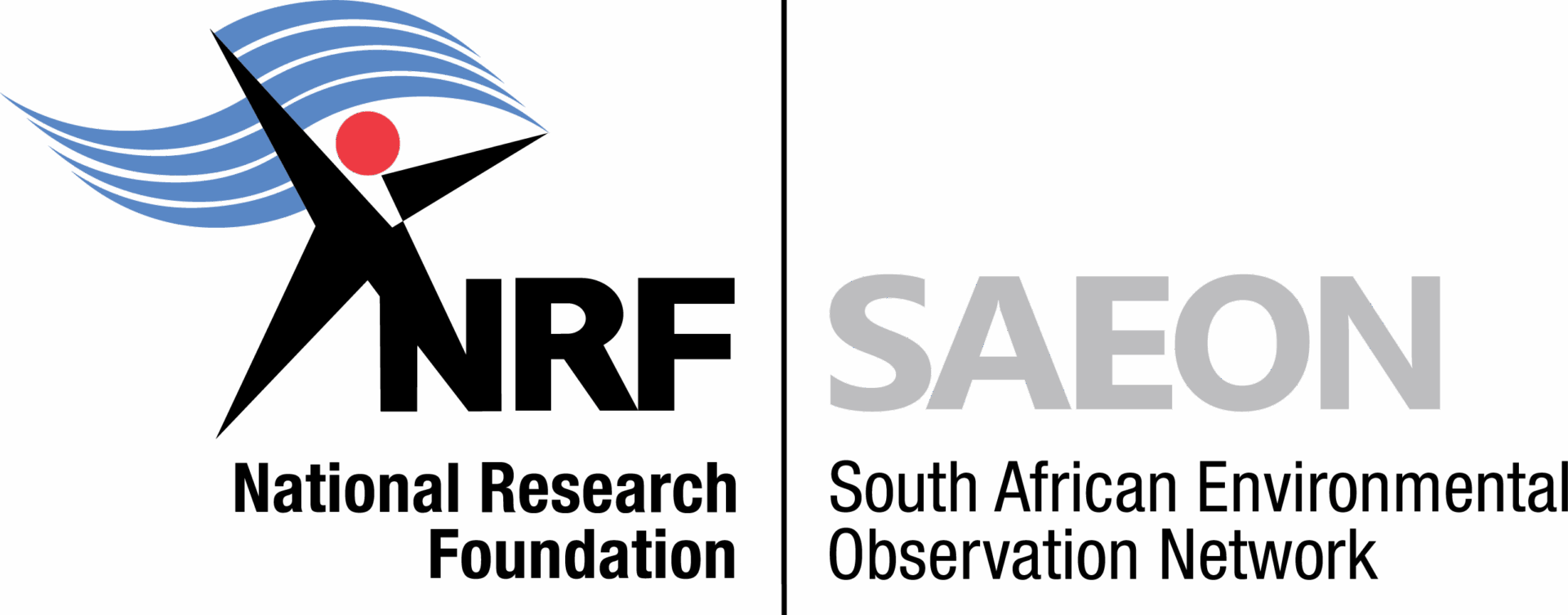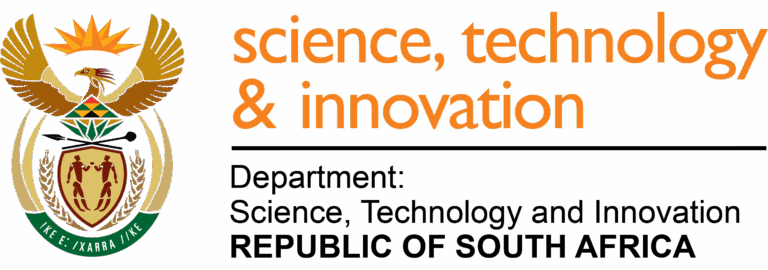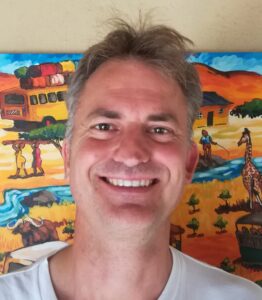
Dr. Tony Swemmer
As Node Manager of the SAEON Ndlovu Node, I am involved in a wide range of long-term environmental research projects, and associated science engagement. My current interests include the role of riparian areas in savanna ecosystems, the impact of elephants on savanna tree communities, and the restoration of grass-dominated ecosystems, from over-grazed, arid rangelands to high-rainfall montane systems
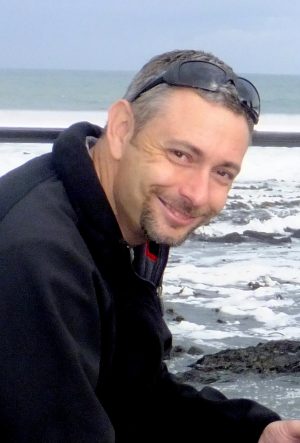
Prof. Dave Thompson
As Biodiversity Scientist I work across the research platforms of the SAEON Ndlovu node, but mainly at the Haenertsburg and Swartbos mountain observatories, and the Satara Experimental Burn Plots. My interests are skewed towards plant population dynamics and community-level responses to disturbances such as fire, herbivory, and climate variability/change. However, my curiosity is sufficiently broad to accommodate research in pollination ecology, population genetics, river flow, crop phenology, mammal behaviour, and sustainable resource use. I am passionate about training (and learning from) postgraduate students and engaging with high school learners
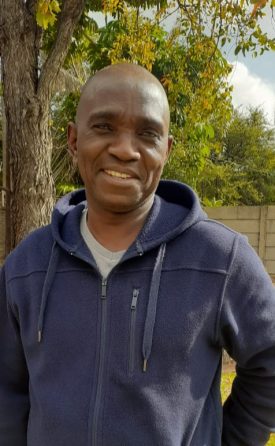
Mr. Joe Sibiya
As Science Engagement Officer I am responsible for coordinating Science Education and Outreach activities at SAEON Ndlovu Node. The activities I coordinate include science camps, school based science projects, educator workshops and webinars with the aim of creating awareness of environmental issues amongst learners, educators and the general public. My interest is to encourage learners to appreciate the value of science in their daily lives and to follow careers in environmental sciences
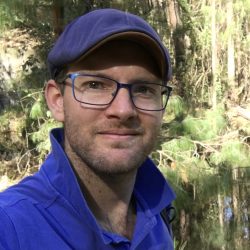
Dr. Rion Lerm
I am the Technician of the SAEON Ndlovu Node and am involved with a wide range of long-term environmental research infrastructure (maintaining meteorological and hydrological instruments and collating the data). I am also deeply involved with node research projects focusing on animal biota such as bird communities. My current interests include animal community ecology, functional ecology and the potential drivers that shape these communities in savanna, grassland and forest systems. My interests stretch further toward remote sensing, GIS and biostatistics that I enjoy teaching to those interested in exploring these technical realms.
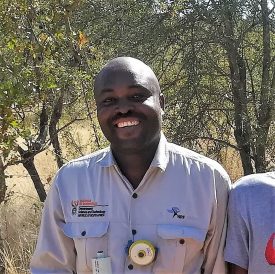
Mr. Mightyman Mashele
Following many years of assisting researchers working in the Kruger National Park, I took up a permanent position of Field Assistant for the SAEON Ndlovu Node in 2010. Based in Welverdiend village, I am responsible for collection of field data on fuelwood harvesting, grass and tree species composition and structure at most of the node sites. I also regularly assist visiting post-graduate students with their fieldwork
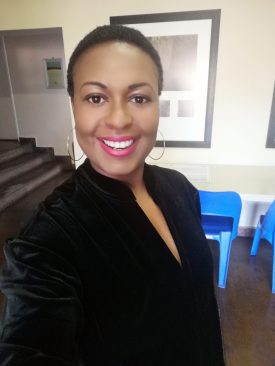
Ms. Una Manave
As Administrative Assistant, I provide administrative support to ensure efficient communication and operation between the Ndlovu Node, National Office and external stakeholders and suppliers. I also support managers and employees through a variety of tasks
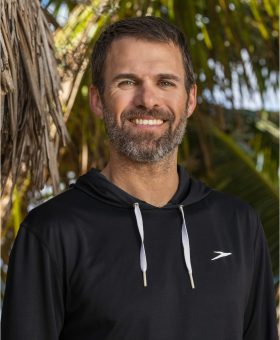
Prof. Deron Burkepile
Deron is at the University of California, Santa Barbara and is an honorary SAEON Research Associate. He is primarily a marine community ecologist, but has a long history of collaboration with the Ndlovu node at the Satara Experimental Burn plots in the savannas of the Kruger National Park. Here his research has focused on the interactive effects and feedbacks of herbivory, fire and productivity on driving the ecology of African savannas. He is passionate about informing the conservation and restoration of the systems he works in, and strongly advocates for comparing commonalities and differences across ecosystems to facilitate a broader and deeper understanding of ecological patterns
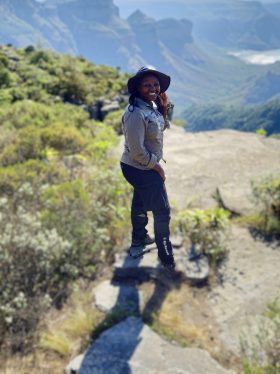
Dr. Retang Mokua
Dr Retang Mokua is a postdoctoral fellow whose research focuses on understanding the impacts of land use and land cover changes on water yield and streamflow characteristics in catchments, under the supervision of Dr. Swemmer. She is passionate about using environmental tracers, such as stable isotopes of water, along with hydrological modeling, to enhance our understanding of hydrological processes such as surface- and groundwater interactions in mountainous catchments. Her interest in isotope hydrology has developed through her long-standing collaboration with the Federal Institute for Geosciences and Natural Resources (BGR) in Germany. Her current work aims to provide valuable insights into how changes in vegetation cover can significantly affect flow patterns and water availability.
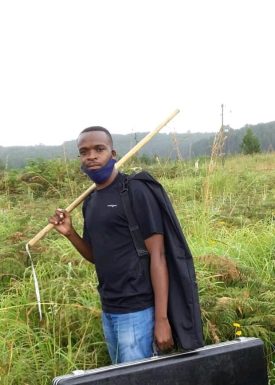
Tsumbedzo Ramalevha
Tsumbedzo spent two years at the node as an intern before embarking on his PhD studies in plant ecology at North-West University under the supervision of Prof. Frances Siebert and Dr. Dave Thompson (SAEON Ndlovu Node). Tsumbedzo grew up in rural Venda in Limpopo and has aspirations of contributing to nature conservation and leadership in science. His PhD research, titled “Responses of belowground bud banks to fire and herbivory in a semi-arid savannah“, makes use of the long-term treatments of the Satara EBP platform to understand the impacts of fire and herbivory on belowground bud banks. Belowground bud banks are a reflection of the vegetative regenerative capacity of the vegetation, and are only relatively recently recognized as a major contributor of ecosystem resilience and functioning in the face of land mismanagement and global climate change
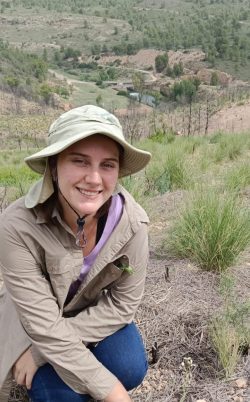
Lanja Oosthuizen
Lanja is currently a Master’s student in grassland ecology at the North-West University (Forb Ecology Research Group) under the supervision of Prof. Stefan Siebert (NWU), Prof. Frances Siebert (NWU) and Dr Dave Thompson (SAEON Ndlovu node). She grew up on a farm near Kimberley in the Northern Cape and is passionate about conservation-related projects. Her honours project was a transplant experiment of the geophyte, Haemanthus montanus, in a transformed grassland for restoration purposes. Her MSc project is titled “The viability and germination of forb seeds in the Highveld grasslands of South Africa”, aimed at improving our understanding of seed germination of native forbs to optimize efforts for restoring biodiversity and ecosystem functioning in transformed grasslands. Restoration efforts have historically focused on re-introducing grass species for maintaining productivity and ecosystem functioning in transformed grasslands while forb species have been neglected as they are difficult to germinate (often requiring dormancy-breaking) and rarely establish naturally in the field. This project will contribute to our knowledge on re-introducing Highveld grassland forb species based on laboratory germination studies
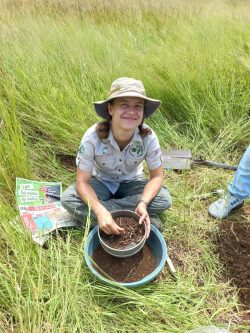
Yani Steyn
Yani is a Master’s student in the Forb Ecology Research Group at the University of North West under the supervision of Prof. Frances Siebert (NWU) and Dr. Dave Thompson (SAEON). Being raised by a nature-loving family sparked Yani’s interest in the field of ecology. Natural cycles, biological interactions and human activities all affect each other in turn. Forming a clear understanding of these factors and their interplay will work towards creating sustainable land use and management practices. Yani’s research, titled “The effect of fire frequency on savanna soil seedbanks” focuses on the interaction between seeds within the soil and fire frequency occurrence. Her fieldwork focuses on savanna ecosystems since fires in these systems are a natural occurrence and often mismanaged. She hopes her research will contribute to form a clearer understanding on how soil seedbanks interact with natural disturbance regimes
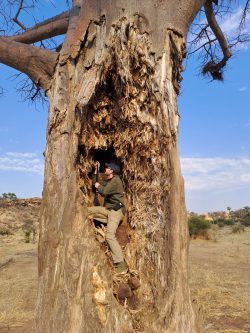
Liam Taylor
Liam is currently working towards his Master’s degree at the University of the Witwatersrand under the supervision of Prof. Ed Witkowski, Dr Dave Thompson (SAEON Ndlovu Node), Dr Sarah Venter (Baobab Foundation) and Dr Melissa Whitecross (Conservation Alpha). His project involves investigating nest site selection of birds in large trees and shrubs at Mapungubwe National Park. This research will aid our understanding of elephant impacts on the landscape, particularly with respect to baobab trees. The study is focused on finding out how increasing elephant populations in national parks create or destroy potential nest sites. An aspiring ecologist, Liam’s interests vary, from studying insects during his Honours year to his current research on avian ecology
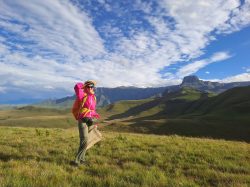
Victoria Roetger
Victoria is a Master’s student in pollination ecology at the University of the Witwatersrand under the supervision of Prof. Glynis Goodman-Cron, Prof. Sandy Lynn Steenhuisen (UFS) and Dr Dave Thompson (SAEON Ndlovu node). She has a keen interest in both botany and conservation, and how climate change affects grassland systems in particular. Her research project is entitled, “Plant-pollinator networks along an altitudinal gradient in the Drakensberg Mountain Centre – implications for climate change“. Her project will provide baseline data of the structure of current plant-pollinator networks ‘up the mountain’ and how climate changes may affect these networks in the future
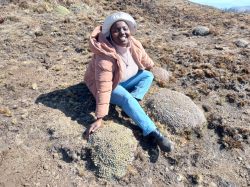
Thulile Buthelezi
Thulile is a Master’s student in Botany at the University of the Free State- Qwaqwa, under the supervision of Prof. Sandy Steenhuisen (UFS), Dr. Stephanie Payne (UFS) and Dr. Dave Thompson (SAEON Ndlovu node). Hailing from the picturesque region of Qwaqwa, nestled amidst the captivating Maloti-Drakensberg mountains, Thulile’s profound connection with nature and her surroundings ignited her passion for understanding the intricate relationships between plants and their environment. Her MSc research, titled “The reproductive ecology of the South African endemic, Euphorbia clavarioides (Euphorbiaceae),” focuses on unravelling the pollination and reproductive ecology of Euphorbia clavarioides, a species unique to South Africa. Thulile’s project involves meticulously studying floral visitors, evaluating the plant’s breeding system, and exploring the rewards offered by its flowers. Additionally, her work aims to shed light on the flower phenology of Euphorbia clavarioides, providing crucial insights into its life cycle, ecological interactions and the possible impacts of a changing climate. With a genuine commitment to preserving biodiversity and a deep-rooted love for her homeland’s natural wonders, Thulile’s research is not just a scholarly pursuit but a meaningful contribution to the conservation and understanding of South Africa’s unique flora

Matilda Mbazo
Matilda Mbazo is a Master’s candidate at the University of Witwatersrand under the supervision of Professor Stefan Grab (WITS), Dr. Dave Thompson (SAEON Ndlovu Node), and Dr. Keenan Stears (University of North Dakota). She is passionate about Geographic Information Systems (GIS) and Remote sensing and how they tie into solving environmental problems, mainly caused by climate change. She completed her undergraduate studies in Geography and Environmental Sciences, and assessed flood impact at the Hennops River using GIS during her Honours.Her Master’s research, titled ‘Using GIS and remote sensing to quantify the interactive effects of extreme drought, fire frequency, and mega-herbivory on tree density in a Marula-Knobthorn savanna‘, makes use of remotely sensed data to assess the combined effects of extreme drought, fire frequency, and herbivory on tree density in a Marula-Knobthorn savanna ecosystem. The study will make use of existing replicated long-term fire manipulation trails in the Satara region of central Kruger National Park, examining fire-return intervals and exclusion of browsers, using GIS and RS tools to quantify the differences in tree density as a result of these factors in isolation and in combination
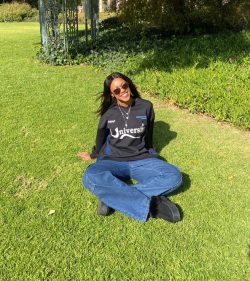
Masego Ramabu
Masego is currently enrolled in a Master’s program in Environmental Science at North-West University, where she is conducting research under the supervision of Prof. Stefan Siebert (NWU), Prof. Dave Thompson (SAEON Ndlovu Node), and Dr. Joao Marcelo-Silva (NWU). Her MSc project, titled “Effects of mechanical control of Pteridium aquilinum and restoration of Woodbush Granite Grassland“, aims to investigate whether mechanical clearing of bracken facilitates the recovery of Woodbush Granite Grassland. Current strategies such as repeated slashing or herbicide application are considered effective for long-term control, yet they are labour-intensive, expensive, and may adversely impact plant diversity and associated ecosystem services. Masego’s research endeavors to identify more environmentally friendly methods for bracken eradication and management to mitigate future invasions.
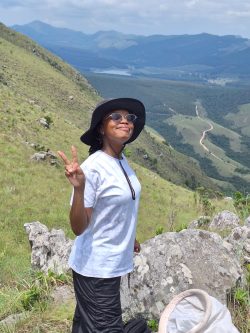
Tshegofatso Mathabe
Tshegofatso Mathabe is a Master’s student in Plant physiology and phytochemistry at the University of the Witwatersrand under the supervision of Profs. Robert Skelton (Wits) and Dave Thompson (SAEON Ndlovu node). She has a keen interest in botany, phytochemistry, specifically toxicology, and sustainability. Her research project is entitled, “Plant defence plasticity: Investigating changes in chemical defence under varying abiotic stress conditions in African savanna grass species”. Her project makes use of long-term research infrastructure in the Kruger National Park, and focuses on the effect of herbivory, fire and drought disturbances on the physical and chemical defences of grasses.
Are you a post-graduate student registered at a South African institution? Then, consider joining the SAEON Graduate Student Network.
Post-doc
2025
Dr Tstisi Maponga (Postdoc., 2022-2025; Defining the ecological impacts of mistletoes on their hosts and their local environments)
2023
Dr. Helga Knoetze (Post-doc., 2022-2023; Ecological legacy effects of mega-carcasses on herbaceous community floristics and structure in an African savanna)
Dr. Ademola Adetunji (Post-doc., 2023; Nano-priming technology for invigorating seeds to enhance grassy biome restoration and service provision)
2021
Dr. Keenan Stears (Post-doc., 2019-2021; Tri-trophic Relationships in Engineered Environments (TREE): Quantifying the influence of anthropogenic disturbance to bottom-up processes on herbivore communities)
2020
Dr. Melissa Schmitt (Post-doc., 2017-2020; Tri-trophic Relationships in Engineered Environments (TREE): Determining the ecological effects of a decade of intensive bush-clearing in a protected-area savanna)
PhD
2025
Dr. Rion Lerm (PhD., 2025; Bird distribution dynamics of the Kruger National Park and surrounds: Drivers and Diversity)
2024
Dr. Marlize Muller (PhD., 2024; Effects of climate variability, land-use change and transformation on
grassland plant diversity in South Africa)
2021
Dr. Amy Marshall (PhD., 2021; The complex socio-ecological system of the lowveld marula bioeconomy catchment)
2017
Dr. Shaeden Gokool (PhD., 2017; )
2015
Tercia Strydom (PhD., 2015; )
MSc
2025
Wynand Muller (MSc., 2025; Linking butterfly diversity to forb community responses to fire and herbivory)
2024
Samista Rooplal (MSc., 2024; Modelling current and future distributions of Warburgia species at continental and local scales)
2020
Clarissa Minnaar (MSc., 2020; Drought effects on the herbaceous community structure of transformed Mopaneveld)
Kaylee van den Bosch (MSc., 2020; An assessment of the reproductive ecology of the Pepperbark tree (Warburgia salutaris) in the Kruger National Park, South Africa)
2019
Joshua Weiss (MSc., 2019; Spatio-temporal change in riparian woodlands of the Kruger National Park: drivers and implications)
Lwendo Rasifudi (MSc., 2019; )
Thobile Dlamini (MSc., 2019; Differential herbivore occupancy of fire -manipulated savannas in the Satara region of the Kruger National Park, South Africa)
2018
Sylvie Kremer-Kohne (MSc., 2018; Population structure and ecology of Aloe lettyae, an endangered Woodbush Granite Grassland endemic)
2017
Ashley Lipsett (MSc., 2017; The spatio-temporal effects of rainfall on streamflow within the Kruger National Park, South Africa.)
Dawid Smith (MSc., 2017; Forb and soil microbe diversity patterns of ultramafic tailings facilities at Phalaborwa)
Reinhardt Raubenheimer (MSc., 2017; )
Thabo Mohlala (MSc., 2017; Fish communities, Klaserie River, climate change)
2016
Amy Trent (MSc., 2016; Mammal utilization of artificial water sources in the central Kruger National Park: Contemporary seasonal patterns and implications for climate change scenarios.)
Jacob Rossouw (MSc., 2016; Application of plant growth promoting substances and arbuscular mycorrhizal fungi for phytostabilisation of mine tailings)
Nanette van Staden (MSc., 2016; Herbaceous species diversity, redundancy and resilience of Mopaneveld across different land-uses)
Nicoletta Maraschin (MSc., 2016; Faunal distribution in relation to rainfall patterns in the Kalahari Gemsbok National Park: 2004 2013)
Robert Taylor (MSc., 2016; Temporal and spatial variation in population structure of the African Baobab (Adansonia digitata) in the Kruger National Park, South Africa)
Rose Mapula (MSc., 2016; A vegetation survey and mapping of the Woodbush Granite Grassland)
Thomas Sikhwivhilu (MSc., 2016; Climate factors controlling the distribution of plant species across an altitudinal gradient: A case study from Marakele National Park, Limpopo Province, South Africa)
2015
Brenden Pienaar (MSc., 2015; The biogeography of Brachystegia woodland relicts in Southern Africa)
Corne Niemandt (MSc., 2015; Anthropogenic impacts on the highly threatened Woodbush Granite Grasslands in Limpopo, South Africa)
Tracey Johnson (MSc., 2015; )
2013
Jennifer Fichett (MSc., 2013; Phenological response of citrus flowering to climate variability and change in Iran: 1960-2010)
Hons
2021
Bonginkosi Mbendana (Hons., 2021; Exploring bush encroachment in the Woodbush Granite Grassland, Haenertsburg Nature Reserve: Using Landsat datasets to map land cover/land use change)
2020
Mokotjie Mfisa (Hons., 2020; Responses of plant species cover to rainfall variability in a critically endangered South African grassland)
2019
Bronwen Moodie (Hons., 2019; In vitro conservation of South African plants)
2016
Nyiko Mutileni (Hons., 2016; Veld management strategies for the endangered Woodbush Granite Grassland, Limpopo provice, South Africa)
2015
Dennis Komape (Hons., 2015; )
2014
Neo Molomo (Hons., 2014; A change analysis of the Malahlapanga wetland in KNP using GIS and aerial imagery: 1942-2012)
2013
Ashley Lipsett (Hons., 2013; Assessing the spatio-temporal relationship between rainfall and Kruger National Park stream flow)
Lerato Mabe (Hons., 2013; )
Nanette van Staden (Hons., 2013; )
Nicoletta Maraschin (Hons., 2013; Webcams monitor faunal use of water troughs in Kgalagadi NP)
Zander Liebenberg (Hons., 2013; )
2012
Amy Trent (Hons., 2012; The value of webcam imagery in savanna ecology: Climate impacts on faunal use of artificial waterholes in the Kruger National Park)
2011
Jennifer Fichett (Hons., 2011; The effects of climate variability, tree age and management practise on increases in mango yields at Bavaria Estate, Hoedspruit, South Africa)
